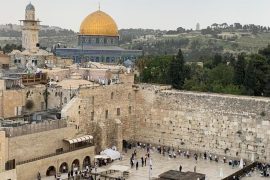A Financial Times article by their Jerusalem correspondent James Shotter (“US hits at Israel’s plans for more settler homes in West Bank”, Jun 27) wasn’t much different from most pieces at the outlet focusing on Israeli communities across the green line.
By that, we mean that its fundamental premise is that settlements are the main impediment to peace, and that it relies entirely, for context, on an unchallenged quote by an NGO (Peace Now) which presumes that peace would happen “now” if Israel would withdrawal from the territories, while asking nothing of the Palestinians.
In the article, the group’s wild claim that “The Israeli government is pushing us at an unprecedented pace towards the full annexation of the West Bank” is unchallenged.
But, perhaps the best illustration of this premise can be seen in the following formulaic assertion from Shotter’s piece:
The international community regards the settlements in the West Bank — territory Palestinians seek as the heart of a future state but which Israel has occupied since 1967 — as illegal, and a US state department spokesman said the US was “deeply troubled” by the news.
Briefly: the last time we checked, the United States was part of the “international community”, and the fact is the U.S. does not consider settlements “illegal”.
Now, let’s unpack what the words highlighted above – various iterations of which have been made frequently by Shotter – are conveying: That the only thing (all or most) Palestinians want is a future state that includes the West Bank, east Jerusalem and Gaza. Further, we’re to believe that the only obstacle to their quest for statehood, in the context of a two-state solution, is Israeli intransigence in continuing to occupy this land, which they refuse to cede.
First, is it true that “Palestinians” – all of most – support a state in the context of two-states? Well, according to recent polls by the Palestinian Center for Policy and Survey Research the answer is no, with only 28% of Palestinians supporting an independent Palestinian state alongside the state of Israel. By contrast, 53% support a return to an “armed intifada”.
But, what about Palestinian leaders? Do they support an independent Palestinian state alongside the state of Israel? The answer also appears to be no. Certainly, Hamas, Palestinian Islamic Jihad, and other terror groups (which enjoy considerable Palestinian support) don’t seek a state alongside Israel. They seek Israel’s destruction.
Moving now to the Palestinian Authority (PA): on three occasions, PA leaders turned down Israeli offers that would have created sovereign Palestinian state in Gaza and almost all of the West Bank – with a capital in east Jerusalem. In fact, the 2nd Intifada, which was orchestrated and waged by Palestinian leaders, began in September 2000, at the height of the peace process, when a two-state solution being negotiated.
The broader implicit message repeated continually at least implicitly by the FT’s Shotter, and by other foreign journalists covering the region, is that Israeli territorial withdrawal will necessarily lead to peace. But, this is an ahistorical assertion given Hamas’s rise after Israel’s disengagement from Gaza, as well as the persistence of terror in the West Bank after the IDF withdrew from large swaths of that territory per Oslo.
None of this is argue for or against Israeli territorial withdrawal, only that that the media’s assumption that there’s a causal relationship between settlement construction and the continuation of the conflict falls apart upon critical scrutiny.





